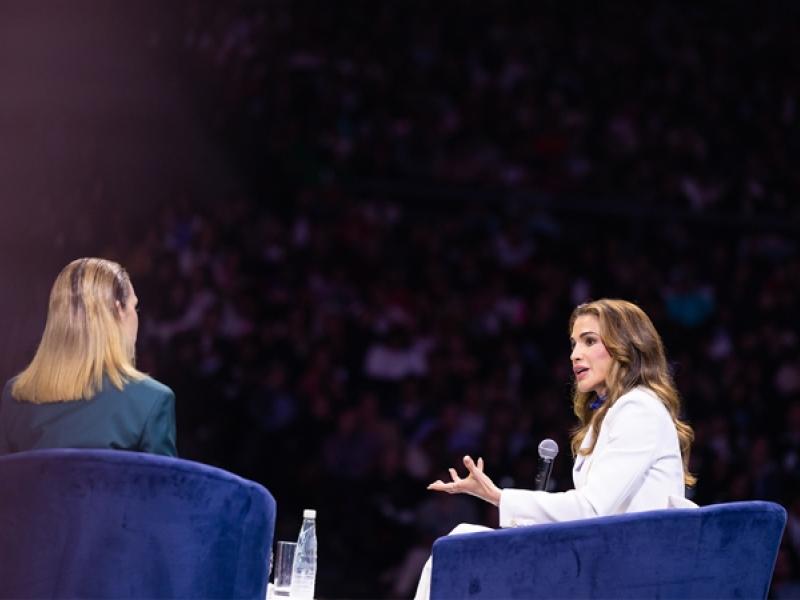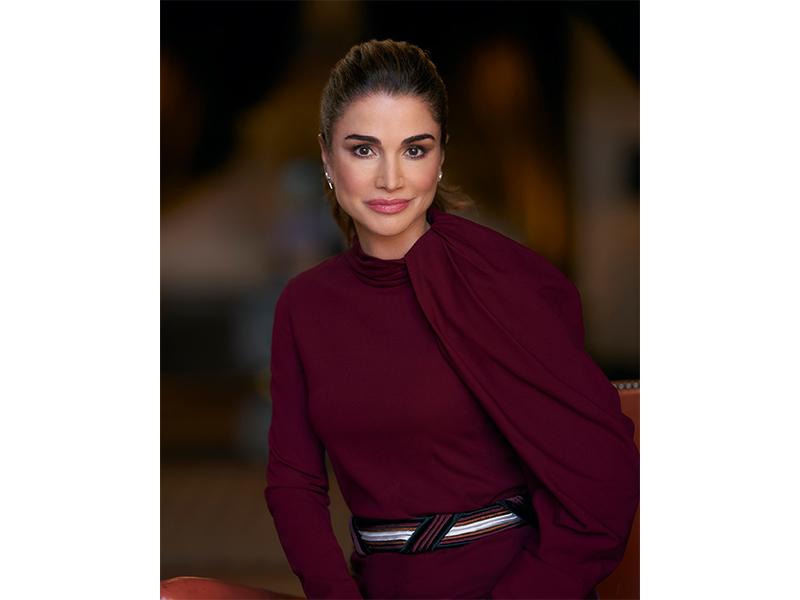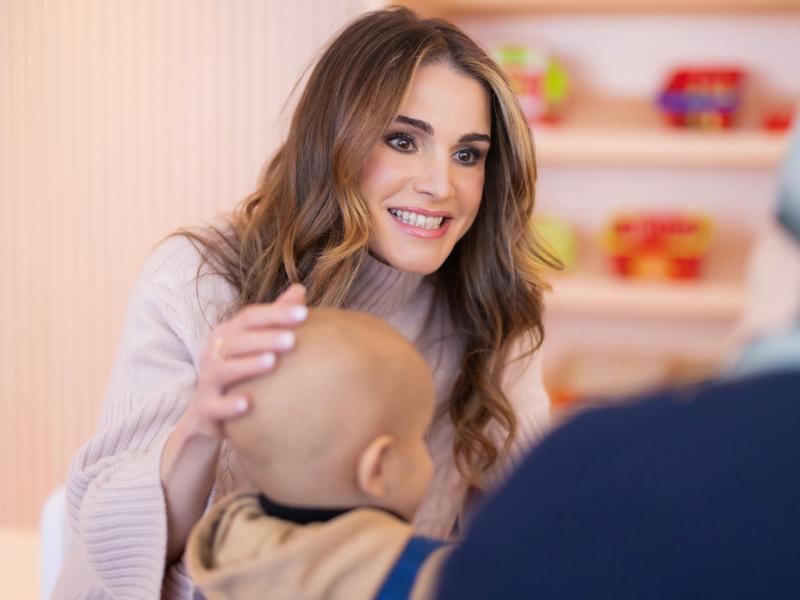T.J. HOLMES: Welcome back to GMA3, everybody. If you've been watching, you’d know that Robach and I were on assignment for the past week and a half, you could argue—of course, covering everything going on with Queen Elizabeth all the mourning period for her and the funeral as well. That was on Monday. And one person at that funeral was a woman who also found herself with the title of Queen at a pretty young age…
AMY ROBACH: Yes, Queen Rania of Jordan, along with her husband, King Abdullah, honored the Queen in London and have now traveled here to New York, for the UN General Assembly and other global events held this week here in this city. And we have the honor and the pleasure to have Her Majesty Queen Rania Al Abdullah of Jordan for a network exclusive interview. Your Majesty, thank you so much for being here.
QUEEN RANIA: Thank you. It's such a pleasure to be back and to be having these face to face interviews again.
AMY ROBACH: It certainly is--I joked with you that we can all be jetlagged together as we go through this interview. But I do want to talk about the Queen. I know you were able to be there at her funeral. But you've called the Queen a partner for Jordan, and a dear family friend. What made Queen Elizabeth II special to you?
QUEEN RANIA: She really meant a lot to all of us. You know, she was a pillar of strength and stability. And when you look at her today, you see that she--there's a lot that political leaders can actually learn from her today. You know, she always remained above the fray, above division, above politics. You know, even in fractious times, she never took sides, she never added to the rift. She was always, through her constancy and her commitment, was always a source of comfort. And so, she really--for me, she was also a role model. She taught the world what it means to be Queen. And what was really special, and I'm sure you guys felt that too, is being in London, even though it was a very sad time, it was also a very reassuring time. Because you felt that not only was she a unifying force for her people in her lifetime, but she brought everyone together in her passing. I have never sensed that kind of sense of oneness, togetherness, a sense of community among all those British people who were out there, you know, waiting for hours to see her, and to pay their respects. No one asked them to do that. They did that because they loved her, because they wanted to say thank you. And in these divisive times that we live in, that was incredibly reassuring.
T.J. HOLMES: You say this, world leaders can learn something from her. What would you like for world leaders in these times to learn from Queen Elizabeth?
QUEEN RANIA: Well, when you look at her reign over 70 years, she never took her eye off the ball. She was always focused on serving her people. She made a promise to them to be there for them, and she was there for them in good times and in bad, always a source of stability and strength and comfort. And nowadays, when you look at leaders, sometimes they're always focusing on the short term rather than the long term--on building their brand rather than, you know, making progress for their people. And we see a lot of, you know, populist rhetoric. So maybe a lot of times it's about popularity rather than principle. She was steadfast in keeping to her principles and her values, and never based her decisions on what would make her more popular in any given day. And I think there's something to be said about that—that kind of consistency. And, you know, just always remaining close to the things that you believe in.
AMY ROBACH: And it should be pointed out, you were just 28 yourself when you became queen. And, I'm curious. You had someone, you mentioned, she was a role model, Queen Elizabeth II, to look up to. Did she ever offer you any advice? Did you ever seek any advice from her?
QUEEN RANIA: Yes, yes. And I was saying earlier that she, you know, she 's so humble that she wouldn't expect, you know, you to ask for her advice. But if you ask for it, she's very generous with it. And, you know, when I first met her, I was still new to the job, and she--you know, she told me the importance of always being there. The sense of duty and discipline is so important. Paying attention to detail, you know, things don't just happen because they do. You have to be on top of things. And she was just always very, very kind, and always offered a guiding hand in general.
T.J. HOLMES: We are going to take a quick break here. So many other topics we want to get at with you. Of course, you’re here. UN General Assembly going on, and certainly a number of topics, a couple of issues, very important to you, we want to get into. So folks, stay with us here on GMA3. We’ll continue with Queen Rania right after the break…
T.J. HOLMES: And welcome back, everybody, Her Majesty Queen Rania of Jordan remains with us here for a network exclusive here in studio with us. We talked a little bit about world leaders and what they can learn from Queen Elizabeth. Look, given everything from the pandemic, to the war in Ukraine, to all kinds of issues, you said misinformation oftentimes is one of the biggest enemies out there. What do you mean by that, and how can we fight that misinformation? And who is perpetuating it?
QUEEN RANIA: Right. Well, you know, I think all of us on a daily basis are bombarded by so much information, news, and you know, change is happening at such a dizzying pace. And I think in the fog of this constant upheaval, information overload, we've all become susceptible and vulnerable to a communication landscape that really rewards outrage over honesty. And that’s why I think misinformation is probably the most dangerous threat to our world today, because we have a lot of complicated challenges that we need to face, like you said, pandemic, climate change, all these issues. And the goal of misinformation isn't just to misinform us, I think it is to influence our thoughts and our actions to the benefit and service of somebody else's political agenda. So the onus is on us to be very vigilant, and to go that extra fact-checking mile before we adopt something as truth. And this misinformation has been so divisive and you see it not just here in the United States, all over the world, how people are starting to divide into tribes, and I find that very worrying, and incredibly dangerous. Because when you're in a tribe, you're just huddled together and just very fearful of the other. And this politics of fear is very dangerous and very divisive for the entire world.
AMY ROBACH: And Your Majesty, I know that you and your husband we mentioned are here for the UN General Assembly, and one of the big topics, one of the big issues, of course, is the war in Ukraine. And I know, an issue near and dear to your heart is refugees. And it's something you face in your own country, what should be a better plan? What would you like to see world leaders come together to do to address this growing and constant problem around the world?
QUEEN RANIA: Right. It’s been reassuring to see how many countries in Europe came together and you know, extended open arms and open policies to Ukrainian refugees. The response was swift and sincere as it should be, to any refugee fleeing any crisis. But there was a disparity in the tone, urgency and generosity extended to Ukrainian refugees, as compared to refugees fleeing other devastation, say, from Syria or South Sudan or Myanmar. You know, there was one European country who earlier this year admitted upwards of half a million Ukrainian refugees, in the past years they had expelled tens of thousands of refugees from other countries. So I was saying earlier, you can't ration humanity or apply it selectively. And so I think the response to the Ukraine crisis set a gold standard, it showed us that the world is capable of mounting a truly humanitarian global response, if the political will is there, and the political will, should be there. And we can't lose sight of the suffering and the plight of people in other parts of the world.
T.J. HOLMES: Well, as you continue to lend your voice to a number of issues, you keep a busy schedule, I think you ca--it’s a job, a responsibility you have, and your family is expanding, you… are--that is right, you got two weddings you're planning next year-
QUEEN RANIA: I have two weddings next year… You know, I’m still—I still can't believe it. My daughter was making fun of me the other day, she's like, Mom, whenever you're introducing me in front of other people, you're always like, she's getting married next year! I think I have to keep sounding it so I can believe it because—and I told them, you guys, I've been like begging you guys to get married for years and you suddenly decide to do it within three months or four months of each other.
T.J. HOLMES: How is that going, your son and your daughter both having weddings next year?
QUEEN RANIA: Well yeah, first of all it's so exciting. I mean, it's incredibly hectic, but the best kind of hectic. I couldn't have chosen better children in law. I think all of us as parents, you know, we want to see our kids grow up and become independent adults and share their life's journey with partners. And I'm so proud of the choices they made. And you know, I used to always say my favorite title is mama, but I think that's going to quickly change to ‘teta’ which is the Arabic word for grandma.
BOTH: Aww, alright.
AMY ROBACH: No pressure, no pressure, kids.
QUEEN RANIA: So my goal is to be like fun grandma, you know, we have a saying in Arabic that no person is dearer to us more than our children than our grandchildren. And so I'm really excited to have babies in my life soon.
T.J. HOLMES: You wanted them to get married, you already got them with grandkids.
QUEEN RANIA: I won't apply pressure. But I will.
T.J. HOLMES: Well, it is an absolute pleasure. We've watched and admired you really from afar for a long time. It is so good to have you here in our studio. Enjoy the rest of your time here in New York. And really, thank you so, so much.
QUEEN RANIA: It’s an absolute pleasure, thank you both.


